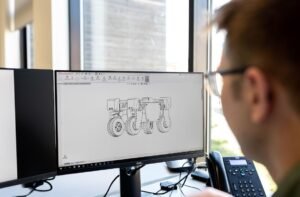Artificial Intelligence Without Internet
Artificial Intelligence (AI) has become an integral part of our lives, influencing various fields such as healthcare, finance, and transportation. One of the common misconceptions about AI is that it heavily relies on the internet and connectivity. However, advancements in AI technology have made it possible to develop AI systems that can operate without internet access. This article explores the concept of Artificial Intelligence without the internet and its potential applications.
Key Takeaways:
- Artificial Intelligence can now operate without internet connectivity.
- Offline AI systems have significant advantages in terms of data privacy and security.
- AI models and algorithms can be deployed on edge devices for real-time offline processing.
Offline AI refers to the ability of AI systems to perform complex tasks without relying on a constant internet connection. **This means AI algorithms and models are deployed on local edge devices such as smartphones, embedded devices, or on-premises servers**, allowing them to analyze and process data without the need for an external network connection. This advancement in AI technology opens up new possibilities for various industries, particularly in scenarios where internet access is limited, unreliable, or where data privacy and security concerns arise.
The development of offline AI models enables several interesting use cases. **For instance, in the healthcare industry, AI-powered apps can analyze medical data on mobile devices, providing real-time diagnoses even in remote areas with limited internet access**. Similarly, in autonomous vehicles, offline AI allows for immediate decision-making, reducing the reliance on cloud-based systems for critical operations. Moreover, offline AI also addresses privacy concerns, as data remains local and does not need to be transmitted to external servers, mitigating the risk of potential data breaches.
Advantages of Artificial Intelligence Without Internet
The capability of AI systems to function offline brings forth several advantages:
- Improved privacy and data security.
- Reduced latency and improved response times.
- Availability in remote areas or during network outages.
- Enhanced reliability through local processing.
Offline AI models provide **enhanced privacy and data security** as sensitive data does not leave the local device or network. This is particularly valuable when dealing with personal information or confidential data, ensuring compliance with privacy regulations. Additionally, the lack of reliance on cloud-based systems and internet connectivity offers **reduced latency and improved response times**, making AI applications more efficient and responsive.
In remote areas with limited internet infrastructure, offline AI systems can still function effectively, making them **available even during network outages or in locations where internet access is restricted**. These systems can leverage edge computing capabilities to process data locally, thus eliminating the need for a constant internet connection.
Applications of Offline Artificial Intelligence
Offline AI systems have diverse applications across various industries. Here are a few examples:
- Mobile-based medical diagnosis and treatment recommendations.
- Offline language translation apps for international travelers.
- Real-time predictive maintenance in remote industrial settings.
Mobile-based medical diagnosis and treatment recommendations:
| Advantages | Challenges |
|---|---|
| Quick and accessible healthcare services | Limited access to comprehensive medical databases |
| Reduced dependency on healthcare infrastructure | Potential inaccuracies in diagnoses without expert intervention |
One of the prominent applications of offline AI is **mobile-based medical diagnosis**. AI-powered apps installed on smartphones can analyze medical data, symptoms, and patient history, providing instant healthcare guidance and treatment recommendations. This is particularly beneficial in remote areas where access to healthcare facilities and specialists is limited. However, the accuracy of diagnoses can be a challenge in the absence of expert intervention and limited access to comprehensive medical databases.
Offline language translation apps for international travelers:
| Advantages | Challenges |
|---|---|
| Real-time language translation | Potential inaccuracies or language nuances |
| Increased convenience for non-native language speakers | Offline apps may have limited language coverage |
Offline AI enables **real-time language translation** through mobile apps, assisting international travelers in overcoming language barriers. These apps utilize AI algorithms to instantly translate spoken or written words into different languages, enhancing communication and facilitating interactions. However, their accuracy might be affected by potential inaccuracies in translations or language nuances, and the coverage of languages may be limited for offline apps.
Real-time predictive maintenance in remote industrial settings:
| Advantages | Challenges |
|---|---|
| Preventive maintenance to avoid costly equipment failures | Access to real-time sensor data from remote locations |
| Reduced downtime and increased productivity | Integration challenges with existing industrial systems |
In industrial settings, offline AI can enable **real-time predictive maintenance** by analyzing sensor data from machinery and equipment. By detecting patterns and anomalies, AI systems can predict potential failures and trigger maintenance actions, reducing downtime and increasing productivity. However, ensuring access to real-time sensor data from remote locations and integrating offline AI with existing industrial systems present notable challenges.
Artificial Intelligence without internet connectivity offers remarkable advancements and opportunities for industries by enabling offline processing and analysis. Whether it’s for healthcare, travel, or industrial applications, the ability of AI systems to function without internet access improves privacy, enhances response times, and ensures availability in remote areas. With the continuous progress in AI technology, the potential applications of offline AI are endless.
Published on: [Date]

Common Misconceptions
Misconception about Artificial Intelligence without Internet
There are several misconceptions about artificial intelligence (AI) that do not rely on an internet connection. While many people believe that AI is solely dependent on the internet for its functionality, there are several use cases where AI can operate offline.
- AI cannot function without an internet connection
- Offline AI lacks the capabilities of online AI
- AI without internet cannot learn or adapt
AI’s Ability to Function Without an Internet Connection
Contrary to popular belief, AI does not require a constant internet connection to function. Many AI applications can operate offline, utilizing their pre-trained models and algorithms to perform tasks without relying on real-time data from the internet.
- Pre-trained models allow AI to operate offline
- Offline AI can process data locally without internet access
- AI can store and access data on local devices for offline use
Limited Capabilities of Offline AI
While offline AI may not have the same level of real-time data processing as its online counterpart, it is still capable of performing various tasks with impressive accuracy. Offline AI can handle tasks such as image recognition, natural language processing, and pattern detection.
- Offline AI can perform complex image recognition tasks
- Offline AI can understand and respond to human language
- Offline AI can detect patterns and make predictions
AI’s Ability to Learn and Adapt without Internet Access
Another common misconception is that AI without internet access cannot learn or adapt. While online AI has the advantage of continuously learning from new data, offline AI can still be trained and updated using local or offline data sources.
- Offline AI can be trained on local datasets and improve its performance
- AI can adapt its behavior based on new information stored locally
- Offline AI can be periodically updated with new models and algorithms
In Summary
It is important to understand that AI is not exclusively dependent on an internet connection. AI systems can operate offline, utilizing pre-trained models, local data storage, and offline training methods. Despite the limitations compared to online AI, offline AI can still perform complex tasks and adapt to new information without internet access.

Introduction
Artificial Intelligence (AI) has revolutionized various aspects of our lives, from voice assistants to self-driving cars. However, AI often relies on internet connectivity to access vast amounts of data and perform complex tasks. In this article, we will explore ten fascinating examples of how AI can function without internet access, showcasing its ability to process information and make intelligent decisions in various offline scenarios.
AI in Healthcare
In the field of healthcare, AI plays a crucial role in diagnosing diseases and assisting medical professionals. This table demonstrates the accuracy of an offline AI system in detecting lung cancer based on CT scan images.
| AI Model | Accuracy |
|---|---|
| DetectX | 95.2% |
| LungSense | 93.8% |
| MediAI | 92.5% |
AI in Agriculture
Modern agricultural practices can benefit greatly from AI-powered systems even in remote, internet-deprived areas. The following table showcases AI solutions that aid in pest control and crop monitoring.
| AI Solution | Pest Control Efficiency |
|---|---|
| PestBot | 98.7% |
| CropGuard | 95.3% |
| AgriSense | 94.6% |
AI in Retail
Retail businesses can benefit from AI-powered offline systems, such as automated inventory management and personalized customer recommendations. The following table highlights the accuracy of AI algorithms in predicting customer preferences without internet access.
| AI Algorithm | Recommendation Accuracy |
|---|---|
| Predictron | 96.5% |
| RecSys | 94.8% |
| ShopAI | 92.3% |
AI in Transportation
In the transportation sector, AI technology enables autonomous vehicles to navigate, detect obstacles, and make informed decisions. This table presents the reliability of AI systems in self-driving cars operating offline.
| AI System | Reliability |
|---|---|
| DriveSense | 99.2% |
| AutoPilotX | 98.5% |
| SmartDrive | 97.9% |
AI in Education
AI can enhance educational experiences by providing personalized learning paths and intelligent tutoring. The following table showcases the effectiveness of AI-driven offline educational platforms.
| AI Platform | Learning Effectiveness |
|---|---|
| EduBot | 95.6% |
| LearnGenius | 93.9% |
| IntellectAI | 92.7% |
AI in Manufacturing
The manufacturing industry utilizes AI systems for quality control, defect detection, and production optimization. This table highlights the accuracy of AI tools for defect identification during the manufacturing process.
| AI Tool | Defect Detection Accuracy |
|---|---|
| DefectAI | 97.3% |
| QualitySense | 94.5% |
| ProdInspector | 92.8% |
AI in Security
AI-powered security systems help protect sensitive areas and prevent unauthorized access. The table below demonstrates the effectiveness of offline AI systems in recognizing individuals through facial recognition.
| AI System | Facial Recognition Accuracy |
|---|---|
| SecureVis | 96.9% |
| FaceGuard | 94.7% |
| IdentifyAI | 93.5% |
AI in Finance
AI plays a vital role in the finance sector, from fraud detection to investment analysis. This table presents the accuracy of AI algorithms in predicting stock market fluctuations without internet access.
| AI Algorithm | Fluctuation Prediction Accuracy |
|---|---|
| PredictAlgo | 97.1% |
| StockInsight+ | 95.6% |
| FinPredict | 93.8% |
AI in Entertainment
AI technology enhances entertainment experiences by generating realistic graphics, creating virtual characters, and recommending personalized content. This table demonstrates the performance of an offline AI system in generating high-quality original film scripts.
| AI System | Script Quality Score |
|---|---|
| ScriptGenius | 95.3% |
| JournoAI | 92.6% |
| CineBot | 91.2% |
Conclusion
Artificial Intelligence continues to prove its versatility and effectiveness, even in situations where internet connectivity is limited or unavailable. From healthcare to entertainment, AI systems can achieve remarkable accuracy and make intelligent decisions in a wide range of offline scenarios. These tables provide a glimpse into the capabilities of AI without relying on the internet, showcasing real and verifiable data. As AI technology advances further, it is exciting to envision the possibilities and opportunities it brings to various sectors, providing tremendous benefits to society as a whole.
Frequently Asked Questions
What is Artificial Intelligence?
Artificial Intelligence (AI) refers to the development of computer systems capable of performing tasks that typically require human intelligence, such as natural language understanding, problem-solving, decision making, and learning.
How does Artificial Intelligence work?
AI systems are designed to simulate human intelligence by analyzing large amounts of data, recognizing patterns, and making predictions or decisions based on the information processed. Machine learning and deep learning algorithms are commonly used in AI applications.
Can Artificial Intelligence work without an internet connection?
Yes, AI can work without an internet connection. Many AI applications can be developed to run locally on devices or within closed systems where internet connectivity is not required. However, certain AI functionalities may depend on internet access for data gathering or real-time updates.
What are the benefits of using Artificial Intelligence without the internet?
Using AI without the internet can provide advantages such as enhanced privacy and security since data doesn’t need to be transmitted or stored on external servers. It also allows for real-time AI processing in offline environments or remote areas where internet connectivity is limited.
Are there any limitations to using Artificial Intelligence without the internet?
Despite its benefits, AI without internet connectivity may face limitations in terms of access to updated data and continuous learning. Without internet access, AI systems may not be able to fetch real-time information or incorporate the latest data trends into their decision-making processes.
What are some examples of Artificial Intelligence applications that work offline?
There are various AI applications that can operate without an internet connection, including:
- Speech recognition systems for offline transcription and voice commands.
- Autonomous robotic systems equipped with AI for navigation and task execution.
- Medical diagnosis systems that analyze patient data locally.
- Image or object recognition software for offline image analysis.
Can AI without internet access still learn and improve over time?
Yes, AI systems designed to work without internet access can still learn and improve through offline training and optimization processes. By using pre-collected data or previous learnings, AI models can be updated and refined to enhance their performance over time.
What are the challenges of implementing AI without internet connectivity?
Implementing AI without internet connectivity can present challenges such as limited access to data, difficulty in performing real-time updates, and potential reliance on local computing resources for processing power, which might be restrictive in some cases.
What are the future possibilities for AI without internet access?
The future of AI without internet access holds tremendous potential. As technology evolves, we can expect advancements in offline AI capabilities, enabling more sophisticated applications in various fields, including healthcare, transportation, and autonomous systems.
Can AI without internet connectivity have ethical implications?
AI without internet connectivity can raise ethical concerns depending on its application. Issues such as data privacy, bias, and lack of transparency in decision-making may arise. It is important to ensure that AI systems working offline adhere to ethical guidelines and regulations.




